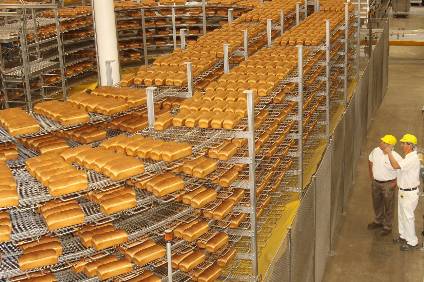
Flowers Foods has outlined the areas where the US bakery giant is hoping for contributions to improved margins as part of a programme of supply-chain “optimisation”.
Changes along Flowers Foods’ supply chain are one of the ways the Nature’s Own bread maker is aiming to boost its profitability. The company has spent recent weeks undertaking what CEO Ryals McMullian has called an “aggressive review” to give its product portfolio “a more margin-accretive growth profile, to streamline our supply chain to support that optimised portfolio and reduce complexity in our operations”.

Discover B2B Marketing That Performs
Combine business intelligence and editorial excellence to reach engaged professionals across 36 leading media platforms.
Speaking to analysts on Thursday (6 February) after Flowers published its 2019 financial results, McMullian, who was promoted from COO to CEO in May, said the company had completed the review.
“Just last week we finished up this review, which included the development of a more holistic customer and product profitability tool. With this tool, we were able to take a much more informed view of product economics and cost to serve. Coming out of the review, we now have actionable insights and are formulating specific plans to among other things, improve certain direct input costs, consolidate our distribution network, improve cube utilisation for lower-volume products and prioritise improvement efforts at under-performing bakeries,” McMullian said.
The Flowers Foods chief said the company had embarked on some initiatives and seen some contribution to margin in the final quarter of 2019. “We have high confidence that once executed, these efforts will remove valueless complexity, improve our operational efficiency and deliver meaningful earnings growth. In fact, we saw some early evidence of just that in the fourth quarter with some modest margin improvement.”
In the final three months of 2019, Flowers saw its sales rise 4.2% to US$917.8m, boosted by pricing/mix and M&A. Volumes dipped 0.9%. Net income was down more than 89% to $2.2m but, adjusted for one-off items, increased 11.6% to $38.1m.

US Tariffs are shifting - will you react or anticipate?
Don’t let policy changes catch you off guard. Stay proactive with real-time data and expert analysis.
By GlobalDataFlowers provided an “adjusted EBITDA” figure, which it said increased 7.3% to $84.5m. The result on that metric represented 9.2% of sales, a 30-basis point increase year-on-year.
McMullian said Flowers is confident the “initial savings” from the projects can be “realised” in 2020 and has projected “benefit” of $10-20m in its guidance for 2020.
He did, however, indicate how the programme would take time. “There are, as part of this, some short-term, medium-term and long-term components to it. The actual supply chain optimisation piece, when you start thinking about bakery optimisation, is the most complex part of this, and that’s the longer-term piece. You’ve got to take into account the makeup of your portfolio. What, if anything, you may or may not plan to exit and how that affects the bakery network is a pretty complicated thing, given all the reciprocal baking that we do. However, on the optimisation front, there are some nearer-in opportunities with regard to the distribution network. And those are some things that we can take care of fairly, fairly quickly.”
Flowers, which also counts Dave’s Killer Bread and Tastykake among the brands in its portfolio, will also be looking at the make-up of its product ranges.
“We’re taking a close look at that. I’ve talked a lot about removing complexity from our operations. And to the extent we have slow-moving SKUs, we need to get them out of the system,” McMullian said.
“If you think about it from a retailer standpoint, they’re cleaning up their shelves, too, which is another reason why it’s very important to have number one, number two brands on the shelf like we do. We’re quite fortunate because we’re able to directly partner with the retailers to meet their needs. So, as we go through the year, we’re constantly evaluating the portfolio [and] we’ll make moves where we see fit.”
McMullian is looking at two other areas: improving Flowers’ under-performing cake business and growing in the foodservice channel. Flowers reported lower sales volumes from cake in the fourth quarter.
From an overall sales standpoint for cake, we’re focused on strategic volume growth to drive cost absorption, reduce complexity through SKU rationalisation, additional distribution opportunities and innovation,” McMullian said. “And underlying all of these efforts is the reinforcement of a culture of excellence that delivers consistently high-quality service and incremental innovation. Our cake business is important to us, and it is a key contributor to our bottom line. By providing focus and setting clear priorities, we intend to accelerate it towards its potential and drive meaningful earnings growth.”
Flowers generates almost $1bn in sales through foodservice annually. “What the team is focused on now is, one, using the new product profitability tool that we have where we can see more true unit economics and cost to serve,” McMullian said. “That really helps us be smarter about the types of business we take on but they are focused on both winning new business, and frankly, winning back some of the lost business as well. And we’re actually going to see some of that come back on in the first quarter, which is encouraging as we stabilise and then grow foodservice.”





